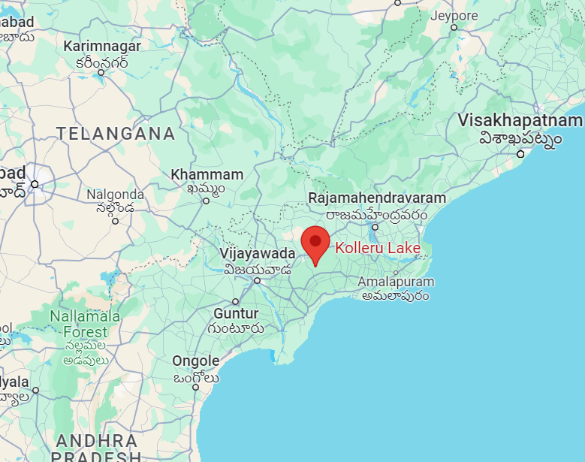Kolleru Lake

- 06 Feb 2025
In News:
The Southern Zonal Bench of the National Green Tribunal (NGT) has recently restrained the Andhra Pradesh government from proceeding with six proposed infrastructure projects in the Kolleru wetland area, citing violations of environmental protocols and lack of statutory clearances.
About Kolleru Lake
- Location: Northeastern Andhra Pradesh, between the Krishna and Godavari river deltas, near Eluru city.
- Type: One of Asia’s largest shallow freshwater lakes, covering an area of 308 sq. km.
- Hydrology:
- Fed by Budameru and Tammileru rivers.
- Drains into the Bay of Bengal via Upputeru river (a tidal water channel).
- Acts as a natural flood-balancing reservoir for the Krishna and Godavari river systems.
- Ecological Importance:
- Declared a Wildlife Sanctuary in 1999 and a Ramsar Site in 2002.
- Designated as an Important Bird Area (IBA) due to the presence of over 50,000 waterfowl annually.
- Lies on the Central Asian Flyway (CAF), a major migratory bird route.
- Key Avian Species:
- Grey Pelican (indicator species), Siberian Cranes, Glossy Ibis, Open-billed Stork, Purple Moorhen, Painted Storks.
Kolleru Bird Sanctuary
- A protected wetland marsh habitat within the Kolleru Lake region.
- Supports diverse aquatic flora and fauna, serving as a crucial ecosystem for migratory and resident bird species.
Infrastructure Projects and Legal Challenges
- The projects were proposed under the entity "A.P. Krishna – Kolleru Salinity Mitigation Projects Corporation Limited" with a total capital outlay of approximately ?2,952 crore.
- The plans included construction of three regulators-cum-roads across the Upputeru river and other barrages, regulators, and sluices, falling within the Coastal Regulation Zone (CRZ).
- The Andhra Pradesh Water Resources Department (WRD) issued G.O. Ms. No. 63 (dated 2nd December 2020) authorizing the project.
Grounds for NGT Intervention
- Key objections included:
- Absence of scientific or ecological studies.
- Lack of consultations with wetland experts, wildlife conservationists, and hydrologists.
- No clearances obtained from:
- Ministry of Environment, Forest and Climate Change (MoEF&CC)
- A.P. Coastal Zone Management Authority (CZMA)
- A.P. Pollution Control Board (PCB)
- National Board for Wildlife (NBWL)
NGT Observations and Ruling
- The tribunal emphasized the need for comprehensive evaluation of ecological and hydrological impacts before proceeding.
- It cited potential threats to the lake’s ecosystem, including:
- Disruption to natural hydrology.
- Loss of biodiversity and eco-sensitive habitats.
- The NGT ruled that the projects should not proceed unless fully compliant with environmental laws and backed by appropriate expert assessments.
- The ruling reinforced India's obligations under the Ramsar Convention and domestic environmental legislation, stressing the urgent need to protect the integrity of the Kolleru ecosystem.
